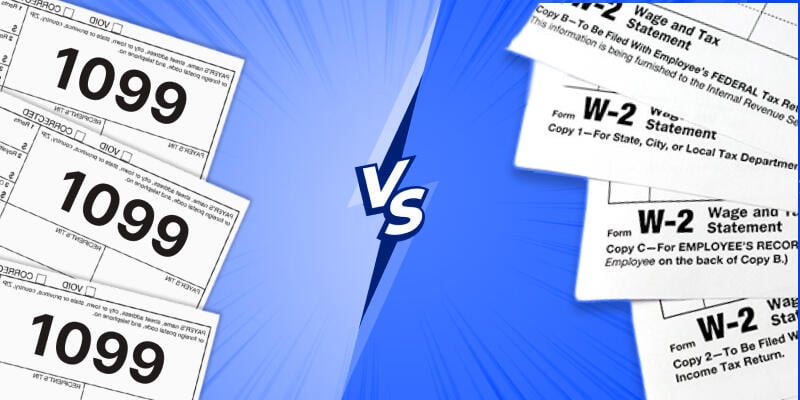
1099 vs. W-2 Tax Form Guide: Which Is Better for Employees and Contractors
When it comes to employment in the United States, there are two primary classifications: 1099 vs W2. As a freelancer, contractor, or someone considering a new job, you might encounter two key terms: 1099 and W-2. These seemingly cryptic codes determine your tax status and workplace benefits. But what exactly do they mean, and which one is better for you?
Here in this blog we explain complete details of 1099 vs w2 including their benefits, pros and cons and which one needs to whom and why.
What’s the Difference Between 1099 and W-2 Forms
| Feature | 1099 (Independent Contractor) | W-2 (Employee) |
| Employment Relationship | Independent contractor; you run your own business | Employee of a company |
| Form Received | 1099-NEC Form (if paid $600 or more) | Form W-2 |
| Taxes | Responsible for self-employment tax (covers both Social Security & Medicare) and income tax | Employer withholds income & payroll taxes; employee pays remaining income tax |
| Benefits | Typically no employer-sponsored benefits | Typically receives health insurance, paid time off, and potential retirement plan contributions |
| Flexibility | High level of control over work schedule and projects | Less control; dictated by employer |
| Income | Potentially higher income; set your own rates | Steady income; capped by salary and bonuses |
What is a 1099?

1099 is a tax form used in the US to report income you earned from someone other than a regular employer. If you are earning from freelancing, contract work, or side hustles. You’ll typically receive a 1099 if you earned at least $600 in a year from a single source.
Benefits of 1099 Form
Flexibility: As a 1099 contractor, you have more flexibility in terms of when and where you work. You can often set your own schedule and choose your projects, providing a greater sense of autonomy.
Tax Advantages: 1099 contractors can take advantage of various tax deductions that may not be available to W2 employees. These deductions can include business expenses such as equipment, travel, and even a home office.
Higher Earning Potential: With the ability to work on multiple projects simultaneously, 1099 contractors may have the opportunity to earn more than their W2 counterparts, especially if they possess specialized skills or expertise.
Independence: Being a 1099 contractor allows you to operate as your own business entity. You have the freedom to market your services, negotiate contracts, and build your brand.
Pros and Cons of 1099 Form (Independent Contractors)
| Pros of 1099 | Cons of 1099 |
| Greater flexibility in work schedule and projects | Inconsistent income |
| Potential for higher earnings | Responsible for self-employment taxes |
| Access to tax deductions for business expenses | No access to benefits such as health insurance or retirement plans |
| Independence and autonomy | Limited legal protections compared to W2 employees |
What is a W2?

A W-2, also known as a Wage and Tax Statement, is a tax form in the United States. It’s an important document used for tax filing. Employers are required to send a W-2 to each employee they paid at least $600 during the previous year.
Benefits of W-2 Form
Stability: W2 employees typically enjoy a more stable income compared to 1099 contractors. They often have a guaranteed salary or hourly wage and may receive benefits such as health insurance, paid time off, and retirement plans.
Employer Protections: W-2 IRS forms are entitled to certain legal protections under labor laws, such as minimum wage, overtime pay, and unemployment benefits. Employers also carry the burden of paying half of the employee’s Social Security and Medicare taxes.
Access to Benefits: W-2 employees may have access to employer-sponsored benefits such as health insurance, dental insurance, vision coverage, and retirement plans. These benefits can provide financial security and peace of mind.
Training and Development: Employers often invest in the training and development of their W2 employees, providing opportunities for career growth and advancement within the company.
Pros and Cons of W-2 IRS Form
| Pros of W2 Form | Cons of W2 Form |
| Stable income and benefits | Limited flexibility in work schedule and projects |
| Legal protections and entitlements | Less control over income and workload |
| Access to employer-sponsored benefits | Subject to withholding taxes and deductions |
| Opportunities for career growth and development | Dependence on employer for stability and security |
1099 vs W2: Which is Better for Employees
Choose a 1099 form if you value autonomy, the ability to control your workload, and the potential for a higher income with freedom and flexibility. Opt for a W-2 form that is better for employees if you prioritize security and stability, steady paycheck, employer-sponsored benefits, and a clear structure for your work.
Conclusion
Both 1099 and W2 classifications offer distinct advantages and disadvantages. It’s essential for individuals to carefully evaluate their options and consider their long-term objectives before making a decision. Whether you choose to embrace the freedom of being a 1099 contractor or the security of being a W2 employee, remember that each path has its own unique rewards and challenges. Many people also search about w2 vs w4 and what is 1099 tax form and more.
FAQ’s
Is a 1099 a W-2?
No, a 1099 is not a W-2. A 1099 form is used to report income earned as an independent contractor or freelancer, while a W-2 form is used to report income earned as an employee. The classification determines tax obligations, benefits, and legal protections.
Is it better to be paid 1099 or W-2?
Being paid as a 1099 can offer more flexibility and potential for higher earnings but also requires managing taxes and benefits independently. On the other hand, being paid as a W-2 provides stability, benefits, and legal protections but may offer less flexibility.
Does 1099 employees pay more taxes?
Yes, a 1099 independent contractor generally pays more in taxes than a W-2 employee. As a 1099 contractor, you’re responsible for both the employee and employer portions of Social Security and Medicare taxes (Self-Employment Tax), which totals 15.3%. W-2 employees only pay the employee portion (7.65%), with the employer covering the rest. Additionally, 1099 contractors may need to pay quarterly estimated taxes, whereas W-2 employees have taxes automatically withheld from their paychecks.
Why did I get a 1099 instead of a W-2?
You get a 1099 form because the company considers you as an independent contractor, not a regular employee.
What are the benefits of 1099?
Benefits of 1099: Be your own boss, choose projects, set rates, potentially higher income, tax deductions for business expenses.
Is it better to be a 1099 employee or W-2?
Whether it’s better to be a 1099 independent contractor or a W-2 employee depends on your personal situation. As a 1099 contractor, you have more flexibility and control over your schedule, but you’re responsible for your own taxes and benefits. On the other hand, W-2 employees receive consistent pay, tax withholding, and benefits like health insurance and retirement plans, but have less flexibility. If you value stability and benefits, W-2 might be better; if you prefer independence and can manage taxes and expenses, 1099 could be the way to go.






